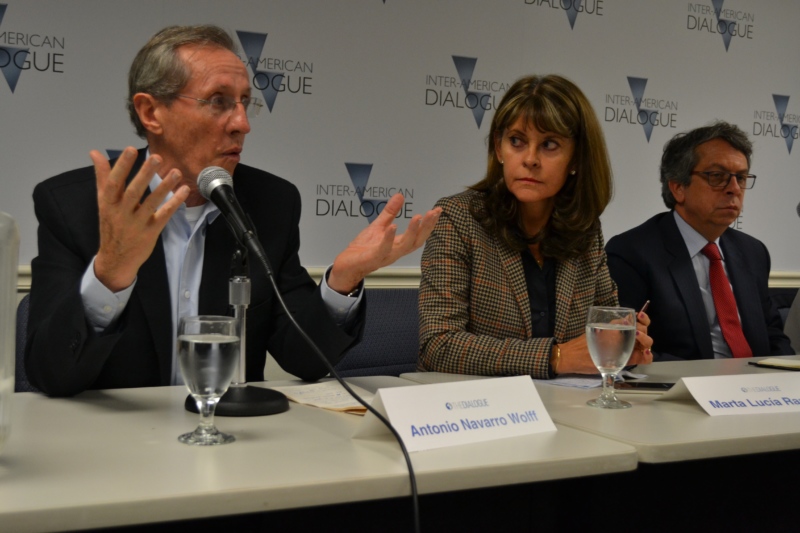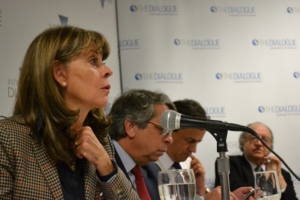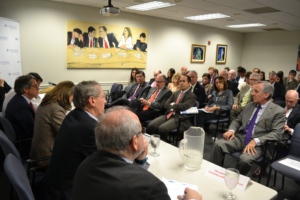The Politics of Peace in Colombia
This post is also available in: Español
 Photo by Ben Raderstorf / Inter-American Dialogue
Photo by Ben Raderstorf / Inter-American Dialogue
The peace negotiations between the Colombian government and the FARC guerrillas are at a decisive moment. The country is closer than ever to finally putting an end to the Western Hemisphere’s most enduring armed conflict.
While all Colombians want peace, there are those who question how the government of President Juan Manuel Santos has conducted the negotiations, particularly in reference to the recently agreed upon transitional justice framework. In addition, the FARC’s eventual participation in politics has also generated much controversy. For many in Colombia, these two elements are nothing short of impunity for criminals and terrorists.
The Inter-American Dialogue convened a panel of distinguished figures from the academic, journalistic, and political spheres in Colombia—each representing a different perspective—to discuss this fundamental issue for Colombia and the region as a whole. The debate was moderated by Michael Shifter, the president of the Dialogue.
Opening the discussion, Senator Antonio Navarro Wolff (himself a former guerrilla leader of the M-19) described the fundamental tension: the signing of the accord is imminent, but Colombian society remains deeply divided over the agreement. In his opinion, a fundamental theme will be the ability of the state to guarantee a presence in the territories that the FARC abandons, preventing reoccupation by other armed criminal groups. The Senator claimed that the impacts of a peace accord would only be felt in the medium to long term, when the country is able to move on to a broader political consensus and development agenda. In contrast, in the short term rural violence will not disappear, and the FARC will not be successful in their initial forays into politics, as they remain deeply unpopular. He also said that the ELN—the second-biggest guerrilla force in the country—will be forced to negotiate with the government eventually.
[caption id="attachment_45590" align="alignleft" width="300"] Photo by Ben Raderstorf / Inter-American Dialogue[/caption]
Photo by Ben Raderstorf / Inter-American Dialogue[/caption]Marta Lucía Ramírez, a former defense minister, criticized the government for not having sufficiently advanced a strong judicial mechanism, one that would punish the FARC for their crimes and dissuade future armed groups. This, to her, is the only way to guarantee peace and avoid future conflicts. She also laid out her opposition to the many judicial and constitutional changes that the government has undertaken as part of the peace framework, many of which, in her opinion, go against institutional stability. The former minister specifically criticized the proposal for a plebiscite on the agreement as a whole, because doing so would not give Colombian society the ability to express its opinions on each element negotiated.
Next, Rodrigo Pardo, the editorial director of Semana magazine and former minister of foreign affairs, defended the elimination of a minimal participation threshold for the plebiscite to be valid, as it incentivizes citizens to vote. Fernando Cepeda Ulloa, professor at the University of the Andes, agreed, highlighting how those who oppose the peace accord will now have to actively vote against, instead of simply abstaining.
[caption id="attachment_45597" align="alignright" width="300"] Photo by Ben Raderstorf / Inter-American Dialogue[/caption]
Photo by Ben Raderstorf / Inter-American Dialogue[/caption]Conversely, Rafael Nieto, a former vice-minister of justice, criticized both the use of a plebiscite as an approval mechanism and the lowering of the participation threshold. For Nieto, with these changes it is now possible that the peace accord could be approved with just 13% of Colombians voting in favor. In his opinion, this reflects the government’s fear that a large majority of Colombians reject the possibility that FARC leaders could face no jail time and could participate in politics without limitations. Finally, he agreed with Ramirez that a referendum, in which voters would approve each aspect of the deal, point-by-point, would be a more suitable way to register public opinion.
In closing, Professor Cepeda Ulloa remarked that the accord between the government and the FARC will only be the end of an armed conflict, and not the creation of peace, as it will be many years before the deal is implemented. In addition, he described the disputes relating to “laying down arms,” as the FARC will not necessarily turn in their weapons because to them, they have not been defeated. Senator Navarro Wolff countered with his own experience, describing how when the M-19 negotiated an accord, they never turned over their weapons. Instead, they destroyed them, a symbol of peace without surrender.



















